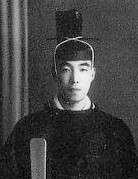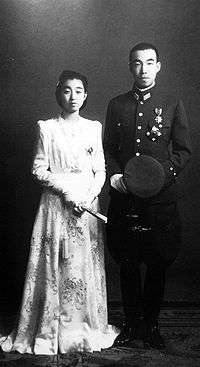Morihiro Higashikuni
Morihiro Higashikuni (東久邇 盛厚, Higashikuni Morihiro), formerly Prince Morihiro (盛厚王, Morihiro Ō, 6 May 1917 – 1 February 1969) was an Imperial Japanese Army officer who was a member of a cadet line of the Japanese imperial family and husband of Emperor Hirohito's eldest daughter.
| Morihiro | |
|---|---|
| Hereditary Prince Higashikuni | |
 Prince Higashikuni Morihito in 1943 | |
| Born | 6 May 1917 Tokyo City, Empire of Japan |
| Died | 1 February 1969 (aged 51) St. Luke's International Hospital, Tokyo, Japan |
| Spouse | Yoshiko Terao
( m. 1964) |
| Issue | Nobuhiko Higashikuni Fumiko Higashikuni Naohiko Higashikuni Hidehiko Higashikuni Yūko Higashikuni Atsuhiko Higashikuni Morihiko Higashikuni |
| House | Higashikuni no miya |
| Father | Naruhiko Higashikuni |
| Mother | Toshiko, Princess Yasu |
| Military career | |
| Allegiance | |
| Service/ | |
| Years of service | 1937–1945 |
| Rank | Major |
| Unit | Kwangtung Army |
| Commands held | First Battery, 1st Heavy Field Artillery Regiment, Kwantung Army |
| Battles/wars | Second Sino-Japanese War Second World War |
| Awards | Grand Cordon of the Order of the Paulownia Flowers Order of the Golden Kite (4th Class) |
Early life
The eldest son and heir of Prince Naruhiko Higashikuni, Prince Morihiro had the distinction of being a grandson of Emperor Meiji and simultaneously both a first cousin and a son-in-law of Emperor Hirohito. He was born in Tokyo, and like most male members of the imperial family during the Empire of Japan, was groomed to pursue a career in the military from an early age.
Military career
After graduation from the Gakushuin Peers’ School and the Central Military Preparatory School, Prince Higashikuni served for a session in the House of Peers. He graduated from the 49th class of Imperial Japanese Army Academy in June 1937, and was commissioned as a second lieutenant of field artillery in August. The following March, he was promoted to lieutenant in the IJA First Artillery Regiment, and was stationed in Manchukuo.
During the Nomonhan Incident in summer 1939, he commanded the First Battery, 1st Heavy Field Artillery Regiment of the Kwantung Army. He withdrew in face of the Soviet counter-offensive without orders during the heat of battle, and was transferred back to Japan on 2 August 1939. The incident was suppressed by Japanese military censors, but provided much propaganda for the Soviet Army. Despite this apparent blot on his service record, he was promoted to captain of the artillery in March 1941. He attended the Army War College from December 1942 to December 1943, and on graduation was promoted to major and placed on the reserve list.
Marriage and family

On 10 October 1943, Prince Higashikuni married seventeen-year-old Princess Shigeko (9 December 1925 – 23 July 1961), the eldest daughter of Emperor Shōwa and Empress Kōjun, who was widely known by her childhood appellation Teru-no-miya. The bride and groom were related several times over through their common descent from Emperor Meiji and Prince Kuni Asahiko (the father of Prince Naruhiko Higashikuni and the grandfather of Empress Kōjun).
The couple had five children, the last three of whom were born after the Higashikuni family was removed from the Imperial Household register:[1]
- Prince Nobuhiko Higashikuni (信彦王, Nobuhiko-ō, 10 March 1945 – 20 March 2019); married 1973 Miss Yoshiko Shimada, with one son, Yukihiko Higashikuni (b. 1974)
- Princess Fumiko Higashikuni (文子女王, Fumiko joō, born 23 December 1946); married Mr. Kazutoshi Omura later to Mr. Takagi Daikichi.
- Hidehiko Higashikuni (東久邇 秀彦, born 30 June 1949): adopted by the Mibu family as "Motohiro Mibu"
- Naohiko Higashikuni (東久邇 真彦, born 1953); married to Ms. Kazuko Sato, with two sons, Teruhiko and Mutsuhiko
- Yūko Higashikuni (東久邇 優子, born 1954) married Mr. Azuma Naooki.
His first wife, former Princess Shigeko, died of cancer in July 1961. In 1964, Morihiro Higashikuni married Miss Yoshiko Terao. The second marriage produced two children:
- Atsuhiko Higashikuni (東久邇 厚彦, born 1966)
- Morihiko Higashikuni (東久邇 盛彦, born 1967)
Later life
In October 1947, the Higashikuni and other branches of the Japanese Imperial Family were divested of their titles and privileges during the American occupation of Japan and became commoners. As a commoner, he attempted several unsuccessful business ventures before eventually becoming the chief of the research division of the Hokkaido Mining and Steamship Company. He died of lung cancer at St. Luke's International Hospital in Tokyo in 1969.
Ancestry
| Ancestors of Morihiro Higashikuni | ||||||||||||||||||||||||||||||||||||||||||||||||||||||||||||||||||||||||||||||||||||||||||||||||||||||||||||||||||||||||||||||||||||||||||||||||||||||||||||||||||||||||||||||||||||||||||||||||||||||||||||||||||||||||||||||||||||||||||||||||||||||||||||||||||||||||||||||||||||||||||||||||||||||||||||||||||||||||||||||||||||||||||||||||||||||||||||||||||||||||||||||||||||||||||||||||||||||||||||||||||||||||||||||||||||||||||||||||||||||||||||||||||||||||||||||||||||||||||||||||||||||||||||||||||||||||||||||||||||||||||||||||||||||||||||||||||||||||||||||||||||||||||||||||||||||||||||||||
|---|---|---|---|---|---|---|---|---|---|---|---|---|---|---|---|---|---|---|---|---|---|---|---|---|---|---|---|---|---|---|---|---|---|---|---|---|---|---|---|---|---|---|---|---|---|---|---|---|---|---|---|---|---|---|---|---|---|---|---|---|---|---|---|---|---|---|---|---|---|---|---|---|---|---|---|---|---|---|---|---|---|---|---|---|---|---|---|---|---|---|---|---|---|---|---|---|---|---|---|---|---|---|---|---|---|---|---|---|---|---|---|---|---|---|---|---|---|---|---|---|---|---|---|---|---|---|---|---|---|---|---|---|---|---|---|---|---|---|---|---|---|---|---|---|---|---|---|---|---|---|---|---|---|---|---|---|---|---|---|---|---|---|---|---|---|---|---|---|---|---|---|---|---|---|---|---|---|---|---|---|---|---|---|---|---|---|---|---|---|---|---|---|---|---|---|---|---|---|---|---|---|---|---|---|---|---|---|---|---|---|---|---|---|---|---|---|---|---|---|---|---|---|---|---|---|---|---|---|---|---|---|---|---|---|---|---|---|---|---|---|---|---|---|---|---|---|---|---|---|---|---|---|---|---|---|---|---|---|---|---|---|---|---|---|---|---|---|---|---|---|---|---|---|---|---|---|---|---|---|---|---|---|---|---|---|---|---|---|---|---|---|---|---|---|---|---|---|---|---|---|---|---|---|---|---|---|---|---|---|---|---|---|---|---|---|---|---|---|---|---|---|---|---|---|---|---|---|---|---|---|---|---|---|---|---|---|---|---|---|---|---|---|---|---|---|---|---|---|---|---|---|---|---|---|---|---|---|---|---|---|---|---|---|---|---|---|---|---|---|---|---|---|---|---|---|---|---|---|---|---|---|---|---|---|---|---|---|---|---|---|---|---|---|---|---|---|---|---|---|---|---|---|---|---|---|---|---|---|---|---|---|---|---|---|---|---|---|---|---|---|---|---|---|---|---|---|---|---|---|---|---|---|---|---|---|---|---|---|---|---|---|---|---|---|---|---|---|---|---|---|---|---|---|---|---|---|---|---|---|---|---|---|---|---|---|---|---|---|---|---|---|---|---|---|---|---|---|---|---|---|---|---|---|---|---|---|---|---|---|---|---|---|---|---|---|---|---|---|---|---|---|---|---|---|---|---|---|---|---|---|---|---|---|---|---|---|---|---|---|---|---|---|---|---|---|---|---|---|---|---|---|---|---|---|---|---|---|---|---|---|---|---|---|---|---|---|---|---|---|---|---|---|---|---|---|---|---|---|---|---|---|---|---|---|---|---|---|---|---|---|---|---|---|---|---|---|---|---|---|---|---|---|---|---|---|---|---|---|---|---|---|---|
| ||||||||||||||||||||||||||||||||||||||||||||||||||||||||||||||||||||||||||||||||||||||||||||||||||||||||||||||||||||||||||||||||||||||||||||||||||||||||||||||||||||||||||||||||||||||||||||||||||||||||||||||||||||||||||||||||||||||||||||||||||||||||||||||||||||||||||||||||||||||||||||||||||||||||||||||||||||||||||||||||||||||||||||||||||||||||||||||||||||||||||||||||||||||||||||||||||||||||||||||||||||||||||||||||||||||||||||||||||||||||||||||||||||||||||||||||||||||||||||||||||||||||||||||||||||||||||||||||||||||||||||||||||||||||||||||||||||||||||||||||||||||||||||||||||||||||||||||||
Gallery
 Prince Morihiro in the Philippines during World War II
Prince Morihiro in the Philippines during World War II
References
- 東久邇宮家 (in Japanese). nekhet. Retrieved September 30, 2011.
- Coox, Alvin D. Nomonhan: Japan Against Russia, 1939. Stanford University Press; Reprint edition (1990). ISBN 0-8047-1835-0
- Dower, John W. Embracing Defeat: Japan in the Wake of World War II. W. W. Norton & Company (2000). ISBN 0-393-32027-8
External links
| Wikimedia Commons has media related to Higashikuni Morihiro. |